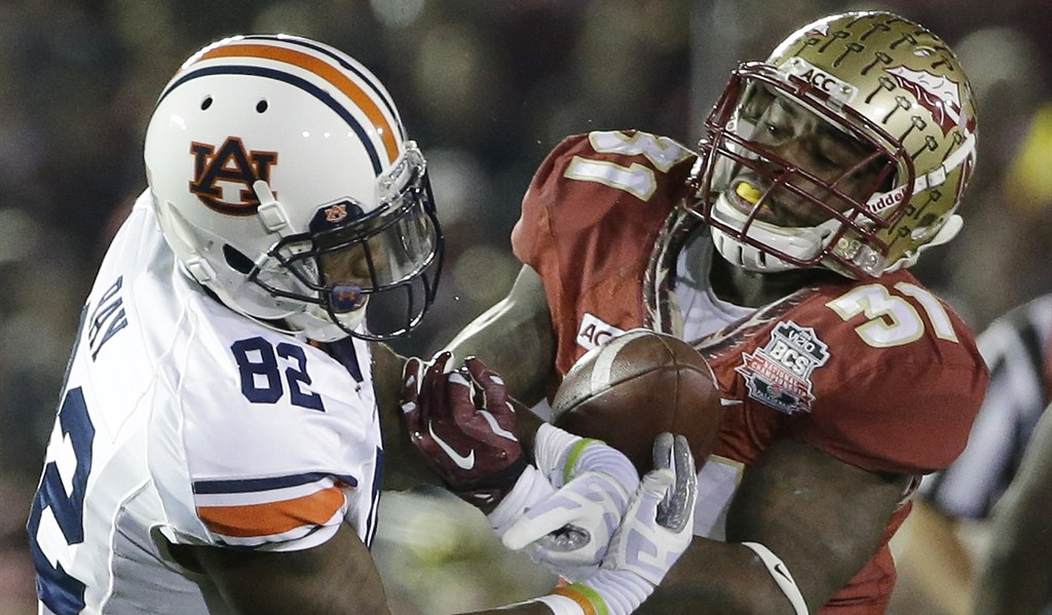In politics, the trend is toward smaller, more homogenous government. Czechoslovakia broke into two countries. So did Sudan. The Balkan peninsula is, well, Balkanizing. Scotland will vote later this year on whether to leave the United Kingdom.
In fact, it’s rare to be both large and successful.
The United States works because the Founders designed a Constitution that carefully divided national powers among three branches and that aimed to push as much power as possible down to the states. China and Russia seem to be succeeding, although their aggressive physical growth (give us Crimea and Ukraine, or Tibet and Hong Kong and nobody gets hurt) may be as much a symptom of weakness as strength; time will tell.
One political entity has bucked this trend until now. But that may be about to change.
The trend in major college football has been to get bigger and bigger. In recent years D-I football conferences scrambled to add as many members as they could. The ACC grew from nine teams at the turn of the century to 12 by raiding the Big East in 2003. Then it did so again 10 years later to reach 15 teams. The Big 10 has jumped from 11 members to 14, without ever changing its name. The SEC and Pac 12 have also expanded.
“It’s all about football,” Syracuse basketball coach Jim Boeheim explained. And he’s right.
The drive to get bigger was triggered first by the desire to hold an annual “championship” football game. Only conferences with 12 members were eligible, leaving the Big XII (ironically with only 10 members) ineligible to hold one. And in recent years, the drive to get bigger than 12 was triggered by the need to remain eligible for the Bowl Championship Series. More teams, more chances to produce a BCS champion.
Recommended
But things may be going to change.
For decades, D-I college football has been the only sport without a real playoff. The bowl games leading up to the “championship game” add nothing. They may be exciting, they may be boring. But, unlike the NFL (or even NHL) playoffs, they have no say in the eventual championship. Instead of building drama, you’re just wasting time watching them, like the series of previews you’re forced to endure before the movie you paid $15 to see.
Next year, for the first time, there will be a football playoff of sorts. There will be four teams involved, and they’ll have to win their way to the title game. This still won’t be a true playoff, because teams will be selected by a committee instead of playing their way in. “Our committee will be charged with picking the four best teams for the playoffs and the best available teams for the other bowl matchups,” head man Bill Hancock explains.
But it’s a start. And once there’s a hint of playoffs in the air, fans will demand a true championship tournament. “The four-team playoff will be more controversial than the BCS ever was,” Hancock admits. “But in the four-team playoff, there will be a number of teams that think they are as good as No. 4.” So it probably won’t be long before the four-team playoff becomes an eight-team playoff.
This will be a challenge, but also an opportunity.
Teams will no longer think they must be in the arms of a big conference to have a shot at a title. It should become possible, as it was into the mid 1980s, for an independent (other than Notre Dame) to compete for a national title (Miami, 1989, West Virginia, 1988, etc.).
This means that schools could potentially afford to return to their roots, in basketball-sized conferences. That means no more than 10 teams, so each team can play home-and-home with each other team (18 games).
There’s no guarantee they would agree to do so, of course. The big conferences still make big money from regular season football. But there’s a chance that basketball (which also makes plenty of cash) will suffer a drop-off in popularity in the new mega-leagues. Everybody loves Syracuse-Duke. But will there ever be a rivalry with Florida State, Wake, Miami, Georgia Tech or UVa.? Far-flung leagues may suffer empty barns for uninteresting matchups.
There’s more to college life than football, as UConn’s two championship teams prove. If we’re lucky, some conference would even want them as members again, some day.

























Join the conversation as a VIP Member